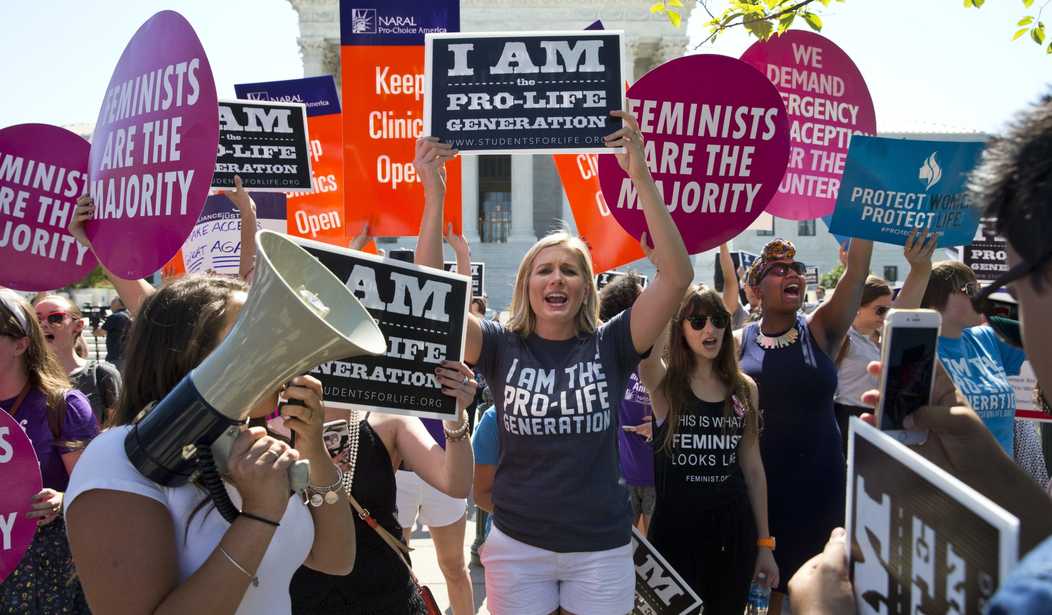An irony of ironies: Texas taxpayers, pro-choice or not, might have to pay the Center for Reproductive Rights’ legal bill, in addition to the money the Lone Star State spent to defend abortion restrictions that were found to be unconstitutional.
At the same time, Gov. Greg Abbott (R) is promising an avalanche of new abortion restrictions out of the Texas Legislature in 2017.
The Center for Reproductive Rights filed a request Oct. 11 for more than $4.5 million in legal fees accrued during its court battle with the state of Texas over abortion restrictions that were struck down as unconstitutional by the U.S. Supreme Court in June.
The request covers expenses accumulated by the nonprofit Center for Reproductive Rights and its pro bono co-counsel during more than two years of litigation in Whole Woman’s Health v. Hellerstedt. The case challenged a Texas law that the center’s attorneys said was nothing but a sham designed to shut down most of the abortion clinics in the state.
Nancy Northup, president and CEO of the Center for Reproductive Rights, said the restrictions that were part of HB2, a 2013 law, had threatened to close 80 percent of the 40-plus abortion clinics in the state.
She said many of the shuttered clinics remain closed, exacerbating what Northup described as an already desperate women’s healthcare crisis in Texas, where family planning budgets have been slashed and the maternal mortality rate has doubled to become the worst in the developed world.
Northup was more than pleased with the Supreme Court’s decision that rejected HB2. But she said legislators violated the public trust by approving the restrictive abortion regulations. Center for Reproductive Rights attorneys and staff, she said, spent thousands of hours fighting “Texas’ blatantly unconstitutional law,” and claimed that is a bill that needs to be paid.
“Time and again, politicians in Texas have proven to be as reckless with taxpayer dollars as they are with the health and well-being of the people they serve,” Northup said. “The substantial expense of successfully bringing this fight to the U.S. Supreme Court is just one consequence of Texas’ decision to defend this sham law, which denied women their basic rights and shuttered clinics that are still struggling to reopen.”
It’s not out of the realm of possibility that Texas will lose this court battle, too. The precedent is on the side of the Center for Reproductive Rights. The organization waged this kind of a legal fight before and won.
The AP reported North Dakota had to pay $245,000 to lawyers representing the state’s only abortion clinic when the Center for Reproductive Rights went after legal fees when the U.S. Supreme Court upheld a lower court’s ruling that struck down the 2013 state’s fetal heartbeat law.
In Wisconsin, taxpayers had to fork over an additional $1.6 million to pay Planned Parenthood’s bill for attorneys who represented the organization and other plaintiffs in a successful lawsuit against a state hospital admitting privileges requirement for abortion doctors.
However, neither that history and the most recent Supreme Court defeat nor the Center for Reproductive Rights’ demand for more than $4.5 million to pay its legal bills has slowed down Gov. Abbott.
Just four days after the Supreme Court ruling, the Abbott administration proposed new abortion rules and regulations that angered Northrup and her people.
While protesters in Halloween costumes waved signs outside the Austin Hilton reading “Greg Abbott Hates Women” and “Keep Abortion Legal,” Gov. Abbott promised members of Texas Alliance for Life at a major fundraising dinner Oct. 5 that he would ask the Legislature to make his Life Initiative proposals the law of the land.
To begin with, Abbott wants to make it a crime to sell fetal tissue.
He also said a proposal would be introduced in the 2017 legislative session that would be designed to increase the number of babies adopted in Texas.
“Another way we can truly advance the pro-life agenda is to do more to aid in adoption services and support the heroic women that make the choice to give a child up for adoption,” Abbott said.
He said the Texas Legislature could also be expected to take action on a proposal to make partial-birth abortions a felony offense, along with a bill that would expand Texas’ child-support enforcement program.
Joe Pojman, executive director of Texas Alliance for Life, said Abbott’s leadership on “the life issue” had been invaluable.
“For several years now, the pro-life spotlight has been centered on Texas, and not by accident,” Pojman said.
However, Alexa Garcia-Ditta, communications director for NARAL Pro-Choice Texas, told the Texas Observer that Abbott’s anti-abortion platform was just “a continuation of what we’ve been seeing in Texas for years — politicians inserting themselves into doctor-patient relations.”
But Abbott stressed to the Texas Alliance for Life fundraising audience and to the 10 protesters waving signs outside the hotel that his agenda was much more than deja vu all over again.
“My promise to the abortion lobby,” Abbott said, “is that Texas will be the strongest pro-life state in the United States of America.”









Join the conversation as a VIP Member